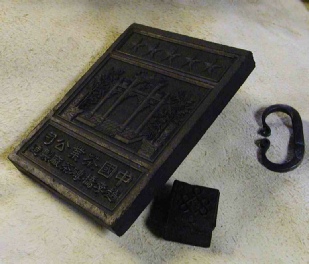Subject Guide

Mountain West
Malachite’s Big Hole
Foods and Consumables:
Although the Mountain Men were generally self-sufficient in terms of foods, there were some food items and flavors which the palate longed for which were unavailable except by trade. After a year of eating mostly meat, the men often welcomed a change in diet, even at highly inflated prices.
|
No. |
Units |
Description |
Cost |
|
1,350 |
pounds |
Plug Tobacco |
13¢/lbs? |
|
620 |
pounds |
Small Finest Tobacco |
13¢/lbs? |
|
1 |
box |
Best Cavendish Tobacco |
45¢/box? |
|
20 |
gross |
| |
|
525 |
pounds |
Coffee |
16¢/lbs |
|
6 |
boxes |
Young & Hyson Teas (6 lbs box) |
45¢/lbs |
|
20 |
papers |
Tea |
31.25¢/paper |
|
|
|
Cocoa Beans |
|
|
20 |
pounds |
Sweet Chocolate |
|
|
1,500 |
pounds |
Brown Havana Sugar |
12.5¢/lbs |
|
3 |
boxes |
White Havana Sugar |
|
|
2 |
barrels |
| |
|
25 |
pounds |
Black Pepper |
12¢/lbs |
|
1 ½ |
dozen |
Bottles of Mustard |
13¢/bottle |
|
4 |
boxes |
Raisins |
$4.00/box? |
|
1 |
barrels |
Dried Apples |
$4.50/barrel? |
|
1 |
barrels |
Dried Peaches |
$3.00/barrel? |
|
150 |
pounds |
Rice |
6¢/lbs |
|
2 |
barrels |
Superfine Flour |
4¢/lbs |
|
321 |
gallons |
Alcohol (Whiskey) |
$1.25/gallon |
|
2 |
gallons |
Rum |
$2.40/gallon |
|
32 |
each |
32 10-Gallon Iron Bound Barrels |
$2.50/barrel |
|
|
|
Salt |
|
|
|
|
English Mustard |
|
|
3 |
pounds |
Cinnamon |
|
|
1 |
dozen |
Peppermint |
|
Tobacco, coffee and tea were favorite items with both Indians and Mountain Men. Besides being a consumable item, the use of tobacco, coffee and tea (passing the pipe and sharing "muddy" water) quickly became part of the formal process of establishing relations for business or social reasons between Indians and Mountain Men.
Coffee, after whiskey, was by far the favorite drink of the Mountain Men, even though tea was more inexpensive, and easier to prepare. Tea was the "de facto" national drink of the English, and the United States had within the last two generations fought two wars with England (Revolutionary War and the War of 1812), and the American Mountain Men were themselves engaged in a bitter commercial conflict with English fur traders (Hudson's Bay Company) for control of the Upper Missouri River region, and the Oregon Country. Coffee was shipped to the mountains in the form of dried green beans, still requiring roasting and grinding. Tea on the other hand was shipped in the form of loose tea leaves.
Bricks of compressed tea leaves were available at the time in China and Russia, but
so far I have found no evidence that brick teas was available anywhere except in
Russian Alaska and along the west coast. If anyone has documentation for this I
sure would be pleased to hear from you. Tea could be brewed by scraping an appropriate
amount of tea from a brick into a cup or pot of hot water. A single tea brick weighing
approximately 2.2 pounds was scored on the backside to facilitate dividing into sixteen
smaller pieces. Each piece could be used to brew a total of one-two gallons of tea.
The entire brick would brew 20-30 gallons total.
but
so far I have found no evidence that brick teas was available anywhere except in
Russian Alaska and along the west coast. If anyone has documentation for this I
sure would be pleased to hear from you. Tea could be brewed by scraping an appropriate
amount of tea from a brick into a cup or pot of hot water. A single tea brick weighing
approximately 2.2 pounds was scored on the backside to facilitate dividing into sixteen
smaller pieces. Each piece could be used to brew a total of one-two gallons of tea.
The entire brick would brew 20-30 gallons total.
Whiskey was generally referred to on the invoices as alcohol, running as close to 200 proof as it could be distilled (Fire Water). The purpose of whiskey was to fuel the rendezvous "party atmosphere." Additionally, the supply company might provide generous samples of whiskey to both Mountain Men and Indians to mellow the atmosphere, muddle the judgment, and to obtain better profits from the trade of furs for supplies. The limited supplies of whiskey which could be sold were further stretched by diluting the the whiskey with creek water. Rum was also commonly taken to rendezvous, but was much more expensive than whiskey. A more complete discussion of ardent spirits may be found under Trade Alcohol.
Sweets were very much in demand, and as much as three-quarters ton (1,500 pounds) of brown sugar were taken annually to rendezvous. Refined white sugar was available, however, was far more expensive than brown sugar.
Back to the Top
Back To Trade Goods